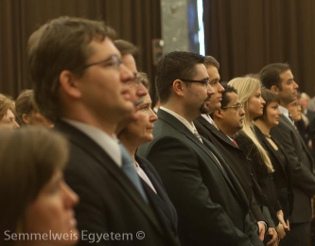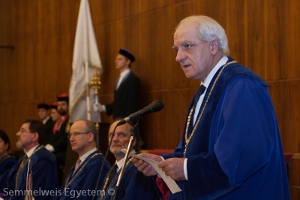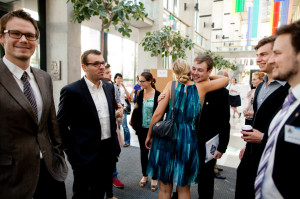One hundred and seven Ph.D. candidates earned their doctoral degrees at this year’s Dies Academicus; 97 of the diplomas were conferred cumma sum laude and 17 cum laude. Held on Saturday, November 5, the ceremony also featured the presentation of professor and associate professor titles, outstanding Ph.D. instructor distinctions and several foundation prizes.
 In his opening address, Vice-Rector Ágoston Szél spoke about how, for many years now, the first Saturday in November has traditionally been the National Science Day, a time to celebrate one of the universities most important activities: research. “The conferring of Ph.D. degrees on this particular day is a very fitting celebration,” he said.
In his opening address, Vice-Rector Ágoston Szél spoke about how, for many years now, the first Saturday in November has traditionally been the National Science Day, a time to celebrate one of the universities most important activities: research. “The conferring of Ph.D. degrees on this particular day is a very fitting celebration,” he said.
Dr. Ágoston Szél called attention to the fact that the Dies Academicus is not just a celebration, however, but also an introductory chord to the scientific month of November, nearly every day of which features some sort of scientific event. He cited the Semmelweis Budapest Award Ceremonial Symposium and the Semmelweis Symposium as but a few examples.
Following the students’ taking of the oath, Dr. Károly Rácz, president of the Doctoral Council and Dr. Ágoston Szél shook each candidate’s hand, accepting them as fellow doctors.

In his ceremonial address, Dr. Károly Rácz asked the newly conferred students to be proud of the diploma they have earned from Semmelweis University, the knowledge and experience they have acquired over the course of their studies, and the fact that the walls of their Alma Mater have witnessed, in addition to their own scientific maturation, the work of some of the greatest figures in Hungarian medical, dental, pharmaceutical, sports and health sciences, as well as the birth of several generations of successful scientists. “Think of this during the trials and tribulations of the coming years, for not only must you prove yourselves as eminent cultivators of your specialty fields, but must also become intellectuals who will shape the future of your nation,” he added.
Numerous distinctions were presented to worthy recipients in a ceremony which closed the Dies Academicus.
Szilvia Tóth
Translated by Gina Gönczi


